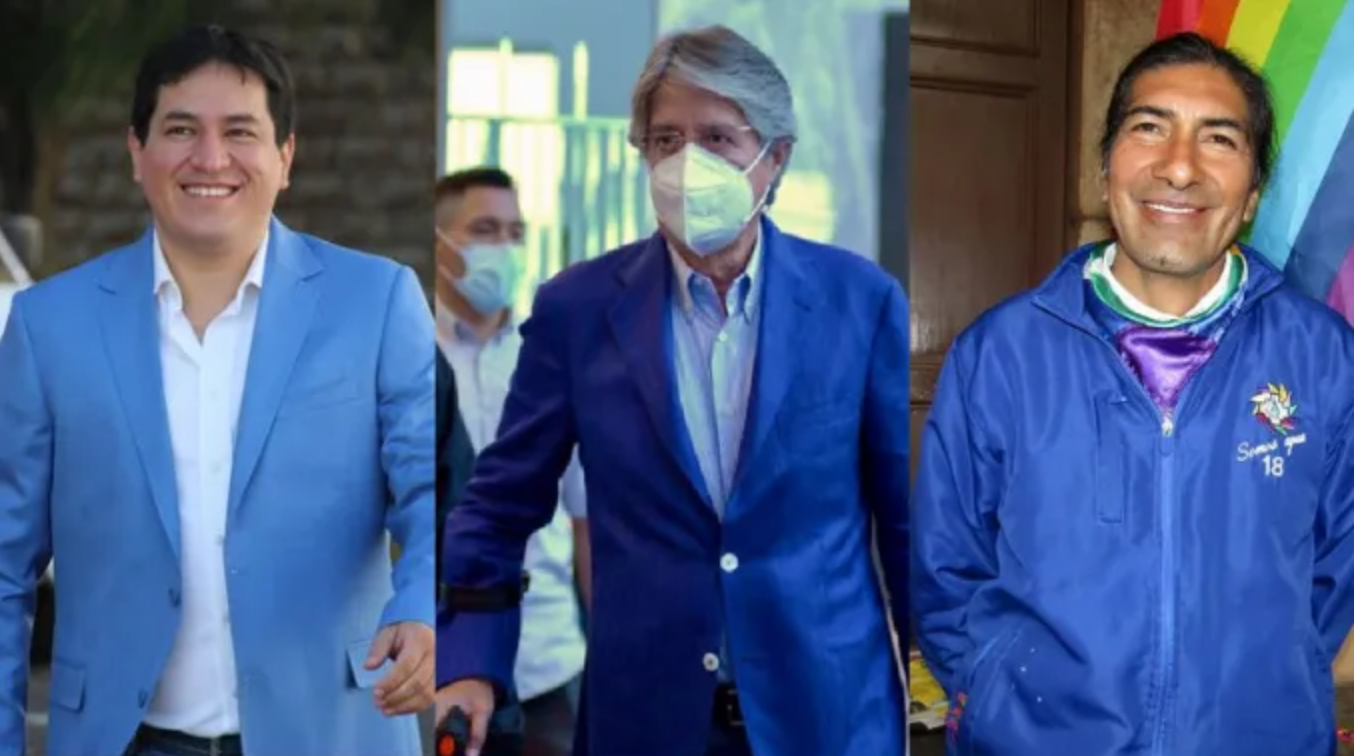
Above photo: (From left) Andrés Arauz, Guillermo Lasso and Yaku Pérez. Pichincha Comunicaciones.
Heads to run-off on April 11.
According to the quick count, Andrés Arauz of the progressive Union for Hope alliance (UNES) won 31.74% of the votes. However, its still unclear who his opponent will be as two candidates are technically tied for second place.
Andrés Arauz of the progressive Union for Hope alliance (UNES) won the first round in the Ecuadorian presidential elections that were held on Sunday, February 7. He obtained 31.74% of the votes, as per the results of the quick count by the national electoral council. It is not fully clear who is in the second place as the results showed a technical tie between Guillermo Lasso of the right-wing Creating Opportunities (CREO) party and Social Christian Party (PSC), and Yaku Pérez of the Indigenous Pachakutik Plurinational Unity Movement party. Lasso obtained 20.05% of the votes, while Pérez secured 19.85% of the votes. The margin of votes between Lasso and Pérez is so narrow (0.2%) that Arauz’s opponent for the run-off cannot be declared until all votes are counted. The run-off election will be held on April 11.
According to the Ecuadorian Constitution, in order to win the presidential election in the first round, a candidate has to obtain more than 50% of the votes or more than 40% of the votes with a 10% lead over the runner-up. The announcement that there would be a run-off was made by the president of the National Electoral Council (CNE) of Ecuador, Diana Atamaint, late on Sunday.
After the announcement of the preliminary results, at a press conference, Arauz, who is supported by former President Rafael Correa, celebrated the victory of the left-wing alliance and thanked the citizens for their support. Nevertheless, he pointed out that the results of the quick count were only “a sample” estimating the trends, and that the final results could be better and the votes in his favor could be “higher.”
“Today, the victory of the Union for Hope is clear, we are in the first place. We received an overwhelming vote from different parts of our country and this is a representative triumph of the national territory,” he said.
In addition, he criticized the CNE for releasing the results that “generate anxiety, controversy, and uncertainty among the candidates.”
“The data announced by the CNE show an apparent technical tie between second and third place [candidates]. It is technically not advisable to publish results of this type because these generate anxiety and controversy among the candidates, when the role of the electoral authority is to give certainty to all parties,” said Arauz.
Meanwhile, former president Correa described the result of the CNE’s quick count as a “lie” and called on the people “to take care of each vote.”
“The CNE’s “quick count” gives us 31%. Everyone knows that this is a lie. In the same actual data already entered, we are at around 38%. Take care of each vote! The deception is obvious,” tweeted Correa.
Ecuadorians also voted for 137 legislators of the National Assembly and five parliamentarians for the Andean Parliament, the deliberative body and of control of the Andean Community, of which Ecuador is a part.
The election day was marked by a high turnout of voters, determined to generate change in the country, which is mired in an economic, health and institutional crisis under the neoliberal regime of president Lenín Moreno.
Related posts:
Views: 0
 RSS Feed
RSS Feed

















 February 8th, 2021
February 8th, 2021  Awake Goy
Awake Goy  Posted in
Posted in  Tags:
Tags: 
















